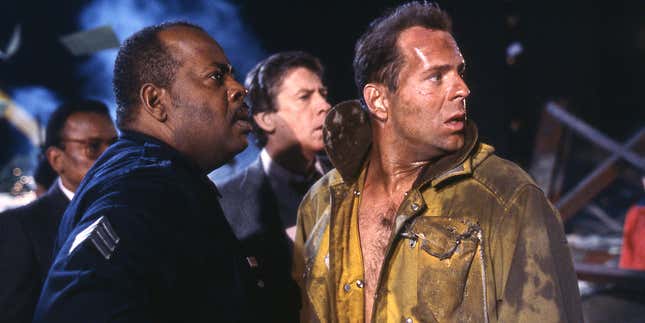
When watching any television show or movie depicting police officers, it’s not hard to see why this sort of copaganda is so consistently effective. The presence of law enforcement on screen usually means there’s also an entity present that the law enforcement is attempting to stop, and this gives you a quick and clean demarcation of protagonist/antagonist and good/evil. But then there’s space for the police to be humanized! Maybe they’re not all good! Maybe one is a lascivious and sloppy drunk. Maybe one is a wise-ass who’s perpetually on the precipice of suspension. Maybe one is violent, racist, and corrupt, but is so good at jamming up the real bad people that their violence, racism, and corruption feels essential. And this moral cloudiness provides nuance!
And then you add danger and revenge and retribution and justice—each of which, when done correctly, make for a compelling viewing experience—-and boom! You get the best television series, and the longest-running TV franchise, and Denzel an Oscar. And when you get all of that, you also pollinate the audience with the general sentiment that cops are inherently good. And then you believe them. And then you root for them in real life like you do on screen, even when they’re doing awful things.
There have been hundreds of egregious examples of this, many of which I’ve seen and, admittedly, enjoyed. But the worst, by far, is in Die Hard. In it, Bruce Willis’s quick-witted, sarcastic, and relentless John McClane is the coolest motherfucker who ever lived. Ten minutes into the movie, you want him to murk the bad guys and be your Spades partner. But he is not the worst! Not even close! For that, you have to leave the Nakatomi Plaza and snuggle up next to Reginald VelJohnson’s Sergeant Al Powell.
Al Powell is probably the third-most vital character in the movie, as he exists as an exposition device and a humanizing audience surrogate. He’s also the only character with an actual arc. McClane and Hans Gruber remain static, but Powell is introduced to us as Twinkie-eating house cat who’s been relegated to office duty because he’s gun-shy—which is clearly meant to be emasculating. But the movie ends with Powell firing his weapon to kill one of the terrorists. Good for Al Powell! He’s a man again!
But do you remember why he’s gun-shy? No? Well, let me remind you. During one of the conversations with McClane, he’s shares that he shot and killed a (presumably) Black kid who had a toy gun. Which means there’s some dead 11-year-old whose only crime was carrying a Super Soaker around an anxious cop from a police department with a history of being the most corrupt in the country. He is, essentially, the cop who killed Tamir Rice. But the movie is constructed in a way that compels us to root for him to kill again. “Yay!” we’re supposed to yelp, after Al Powell kills Karl the Terrorist. “Al Powell got his dick back! The streets are safe again!”
Let’s just hope he didn’t kill any more kids!

